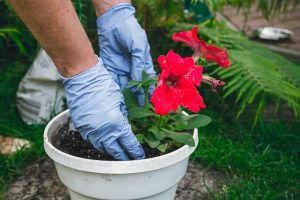Get Your Garden Growing: The Top Jobs to Tackle in April for Gardeners

Spring is finally here, and that means it’s time to get your garden ready for the warmer months ahead. April is the perfect month for UK gardeners to start preparing their outdoor space for the summer months. Whether you’re an experienced green thumb or just starting out, there are plenty of tasks to keep you busy. In this article, we’ll take a look at the top jobs to tackle in April to ensure your garden is in tip-top shape for the months ahead. Recently we looked at jobs for March in the garden.
Preparing Your Soil For Planting
One of the most important tasks to tackle in April is preparing your soil for planting. This involves removing any weeds, rocks, or debris that may have accumulated over the winter months. Once you’ve cleared the area, it’s time to add some organic matter to the soil. This can be in the form of compost, well-rotted manure, or leaf mould. Adding organic matter helps to improve soil structure, retain moisture, and provide important nutrients for your plants.
Next, it’s time to get your soil tested. This will help you determine its pH level and nutrient content. You can either purchase a soil testing kit or send a sample to a laboratory for analysis. Once you know the pH level of your soil, you can make any necessary adjustments. For example, if your soil is too acidic, you may want to add lime to raise the pH level.
Finally, it’s time to add some fertiliser to your soil. This will provide your plants with the nutrients they need to grow strong and healthy. Choose a fertiliser that is appropriate for the types of plants you will be growing.
Pruning and tidying up winter damage
Winter can be tough on your garden, and it’s likely that you’ll have some pruning and tidying up to do in April. This is especially true for deciduous shrubs and trees. Look for any dead or damaged branches and remove them with a sharp pair of pruning shears. This will help to promote new growth and keep your plants healthy.
It’s also a good idea to remove any dead leaves or debris that may have accumulated around your plants. This will help to prevent the spread of disease and pests. If you have any perennials that have died back over the winter, now is the time to cut them back to the ground.
Planting early-season vegetables and herbs
April is the perfect time to start planting early-season vegetables and herbs. This includes cool-season crops such as peas, lettuce, and spinach. These plants can be sown directly into the soil or started indoors and transplanted later.
When planting, make sure to follow the instructions on the seed packet. This will give you important information about when and how to plant your seeds. You should also make sure to water your plants regularly and keep an eye out for any signs of pests or disease.
Starting annuals indoors and transplanting seedlings
If you’re looking to add some colour to your garden, now is the time to start planting annuals. Many annuals, such as petunias and marigolds, can be started indoors and transplanted outside once the weather warms up. This will give your plants a head start and help to ensure that they bloom earlier.
When starting seeds indoors, it’s important to provide them with plenty of light and water. You may also want to use a seed starting mix, which is designed to provide your plants with the nutrients they need to grow strong and healthy.
Once your seedlings are large enough, it’s time to transplant them outside. Make sure to do this on a cloudy day or in the evening, as this will help to reduce stress on your plants. When transplanting, make sure to dig a hole large enough to accommodate the roots of your seedlings.
Lawn care and maintenance
April is also the perfect time to start thinking about your lawn. This includes tasks such as fertilising, aerating, and mowing. When fertilising your lawn, choose a product that is appropriate for the type of grass you have. You should also make sure to water your lawn regularly and keep an eye out for any signs of pests or disease.
Aerating your lawn involves creating small holes in the soil to allow air, water, and nutrients to penetrate deeper into the roots of your grass. This can be done using a machine or by using a garden fork to poke holes in the soil.
When mowing your lawn, make sure to keep the blades sharp and adjust the height of your mower based on the type of grass you have. This will help to ensure a healthy, lush lawn.
Adding colour to your garden with spring bulbs and perennials
Spring is a time of renewal, and what better way to celebrate than by adding some colour to your garden? This can be done by planting spring bulbs and perennials. Some popular choices include tulips, daffodils, and crocuses.
When planting bulbs, make sure to choose a location that receives plenty of sunlight and has well-draining soil. You should also make sure to plant your bulbs at the appropriate depth, which is typically three times the height of the bulb.
Perennials, on the other hand, are plants that come back year after year. They require less maintenance than annuals and can provide your garden with colour and interest for many years. Some popular choices include daylilies, hostas, and coneflowers.
Attracting pollinators to your garden
Pollinators such as bees and butterflies play an important role in the health of your garden. They help to pollinate your plants, which in turn helps to ensure that you have a bountiful harvest. To attract pollinators to your garden, you can plant a variety of flowers and herbs that are known to be attractive to bees and butterflies. Some popular choices include lavender, thyme, and sunflowers.
Tips for garden pest control
One of the biggest challenges of gardening is dealing with pests. Whether it’s slugs, snails, or aphids, there are plenty of pests that can wreak havoc on your garden. Fortunately, there are a number of natural methods you can use to control pests without resorting to harmful chemicals.
One of the most effective methods is to encourage natural predators such as ladybugs and lacewings. You can also use physical barriers such as netting to keep pests out of your garden. Finally, you can use natural remedies such as garlic spray or neem oil to repel pests.
Conclusion: Enjoying the fruits of your labour in the coming months
April is an exciting time for UK gardeners, as it marks the beginning of the gardening season. By following these tips, you can ensure that your garden is in tip-top shape for the months ahead. From preparing your soil to planting early-season vegetables and herbs, there’s plenty to keep you busy in the garden. So, grab your tools and get to work. With a little bit of effort, you’ll be enjoying the fruits of your labour in the coming months.
